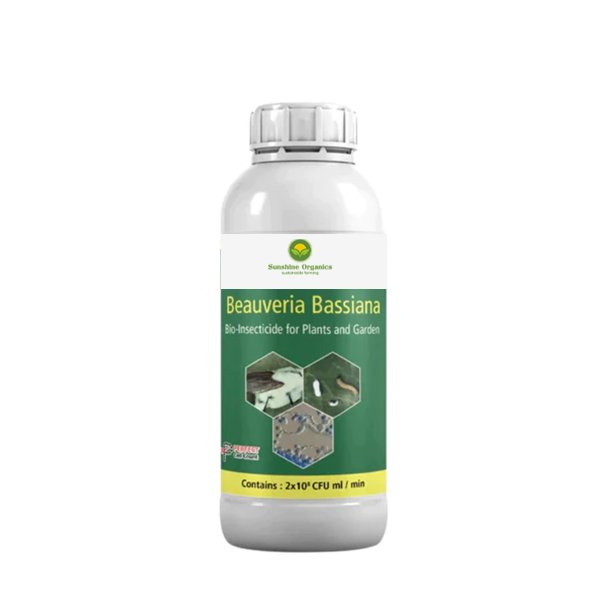Bio Control Agents
Sunshine Pseudomonas Fluorescence is a potent biological control agent designed to enhance plant health and manage soil-borne pathogens. Featuring beneficial strains of seudomonas fluorescens, this product is effective in suppressing a wide range of plant diseases and romoting vigorous plant growth.
Sunshine Pseudomonas Fluorescence is a omprehensive and eco-friendly solution for managing soil-borne diseases and boosting plant health across a diverse range of crops, contributing to sustainable agricultural practices.
- Enhances plant growth and resilience.
- Reduces reliance on chemical fungicides and pesticides.
- Improves soil health and disease suppression.
- Versatile application methods suitable for various crops.
- Seed Treatment:
- Mix 100 ml of Sunshine Pseudomonas with rice gruel or a 5% jaggery solution.
- Treat the seed materials required for an acre in the slurry before sowing.
- Seedling, Tuber, and Sett Treatment:
- Dip the seedling, tuber, and sett required for an acre in a solution of 1 liter of Sunshine Pseudomonas in 50 liters of water.
- Foliar Spray:
- Mix 10 ml of Sunshine Pseudomonas and 10 gm of jaggery per liter of water.
- Spray in the evening for best results.
- Repeat the spray every 7 days.
- Soil Application:
- Mix 3 liters of Sunshine Pseudomonas per acre with 200 kg of well-decomposed farmyard manure or biocompost and apply to the field.
- For banana and coconut, apply 30 ml of Sunshine Pseudomonas mixed with 1 kg of well-decomposed farmyard manure near the root zone and cover with soil.
- Drip Irrigation:
- Apply 3 liters of Sunshine Pseudomonas per acre through fertigation.
- Cereal and Cash Crops:
- Sugarcane, Paddy, Banana, Arecanut
- Oilseeds and Pulses:
- Groundnut, Pulses
- Spices and Aromatics:
- Turmeric, Cardamom, Pepper, Ginger
- Fruiting Crops:
- Coconut, Grapes, Mulberry
- Vegetables:
- Tomato, Bhendi (Okra), Brinjal (Eggplant), Chillies, Onion, Potato
- Flowering Plants:
- Various flowering plants
- Specialty Crops:
- Tea, Coffee, Betelvine
- Root Rot: Effective against pathogens like Fusarium and Pythium.
- Damping-Off: Manages diseases affecting seedlings and young plants.
- Wilts: Reduces incidence of wilt diseases.
- General Soil-Borne Pathogens: Suppresses various soil-borne pathogens.
- Liquid Form: 500 ml, 1 liter, 5 liters, 30 liters, and 50 liters.
- Powder Form: 500 grams, 1 kg and 5 kg packets.
Pseudomonas Fluorescence
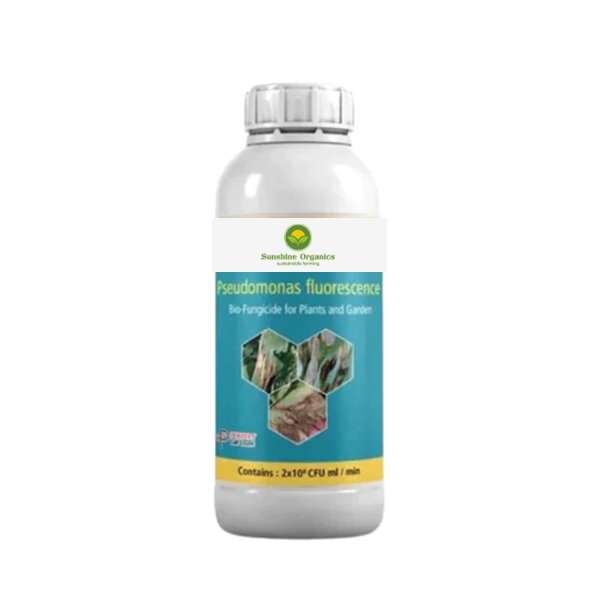
Trichoderma Viride is a powerful biological control agent known for its effectiveness in managing soil-borne pathogens and enhancing plant health. This beneficial fungus competes with harmful microbes, produces antifungal compounds, and improves soil conditions, leading to healthier plants and better crop yields.
Trichoderma Viride offers a natural and effective solution for integrated pest management, ensuring healthier plants and improved agricultural productivity through its biological control capabilities.
- Enhances plant growth and improves root health.
- Reduces reliance on chemical fungicides, supporting eco-friendly agriculture.
- Improves soil fertility and promotes a balanced soil ecosystem.
- Effective against a broad spectrum of soil-borne diseases.
- Soil Application:
- Mix 3 liters of Trichoderma Viride per acre with 200 kg of well-decomposed farmyard manure or biocompost.
- Apply evenly to the soil before planting or during the growing season.
- Seed Treatment:
- Coat seeds with a suspension of Trichoderma Viride prepared as per the product label instructions.
- Allow seeds to dry before planting.
- Foliar Spray:
- Mix 10 ml of Trichoderma Viride with 10 gm of jaggery per liter of water.
- Spray on plant foliage in the evening for best results.
- Repeat every 7 days as needed.
- Drip Irrigation:
- Incorporate 3 liters of Trichoderma Viride per acre into the irrigation system through fertigation.
- Cereal Crops:
- Sugarcane, Cotton, Paddy, Sorghum
- Oilseeds:
- Sunflower, Groundnut, Mustard
- Spices and Aromatics:
- Cumin, Cardamom
- Fruiting Crops:
- Grapes, Guava, Sapota, Citrus, Mango, Pomegranate, Custard Apple, Coconut
- Vegetables:
- General vegetables
- Flowering Plants:
- Various flowering plants
- Specialty Crops:
- Tea, Coffee
- Root Rot: Effective against pathogens like Fusarium and Pythium.
- Damping-Off: Controls damping-off diseases affecting seedlings.
- Wilts: Manages wilt diseases by uppressing wilt-causing fungi.
- General Soil-Borne Pathogens: Reduces the incidence of various soil-borne diseases.
- Liquid Form: 500 ml, 1 liter, 5 liters, 30 liters, and 50 liters.
- Powder Form: 500 grams, 1 kg and 5 kg packets.
Trichoderma Viride
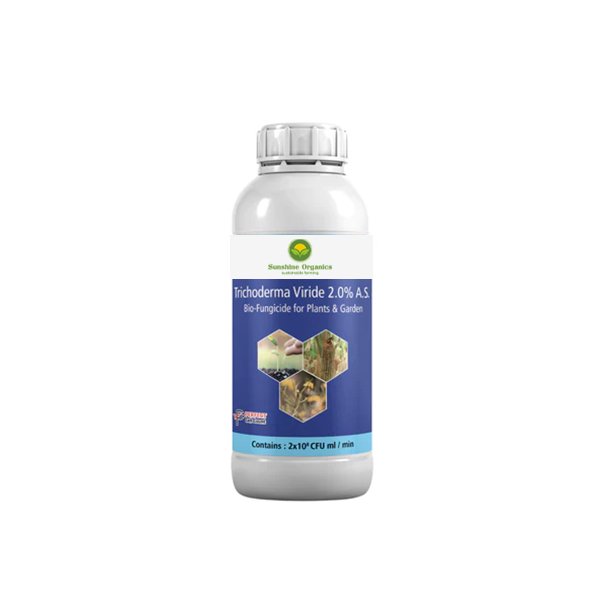
Paecilomyces Lilacinus is a specialized biological control agent designed to manage nematode populations and enhance soil health. This beneficial fungus is renowned for its ability to parasitize and kill nematode eggs and larvae, thereby reducing damage to plant roots and improving crop yields.
Paecilomyces Lilacinus provides an effective and environmentally friendly solution for managing nematode-related issues, ensuring healthier plants and better yields through natural biological control methods.
- Reduces nematode populations and mitigates root damage.
- Improves overall plant health and crop productivity.
- Supports sustainable agriculture by reducing the need for chemical nematicides.
- Enhances soil fertility and promotes a balanced soil ecosystem.
- Soil Application:
- Mix 3 liters of Paecilomyces Lilacinus per acre with 200 kg of well-decomposed farmyard manure or biocompost.
- Apply to the soil before planting or during the growing season for effective nematode control.
- Pre-Planting Treatment:
- Incorporate the product into the soil prior to planting to establish control of nematodes before crop emergence.
- Seed Treatment:
- Coat seeds with a suspension of Paecilomyces Lilacinus prepared according to the product label instructions.
- Allow seeds to dry before planting.
- Drip Irrigation:
- Apply 5 liters of Paecilomyces Lilacinus per acre through fertigation systems for targeted nematode management.
- Cereal Crops:
- Sugarcane, Cotton, Paddy, Sorghum
- Oilseeds:
- Sunflower, Groundnut, Mustard
- Spices:
- Cumin, Cardamom
- Fruiting Crops:
- Grapes, Guava, Sapota, Citrus, Mango, Pomegranate, Custard Apple, Coconut
- Vegetables:
- General vegetables
- Flowering Plants:
- Various flowering plants
- Specialty Crops:
- Tea, Coffee
- Root-Knot Nematodes: Effective against nematodes that cause galls and root damage.
- Cyst Nematodes: Targets and reduces populations of cyst-forming nematodes.
- Other Plant-Parasitic Nematodes: Manages various nematode species impacting plant roots.
- Liquid Form: 500 ml, 1 liter, 5 liters, 30 liters, and 50 liters.
- Powder Form: 500 grams, 1 kg and 5 kg packets.
Paecilomyces Lilacinus
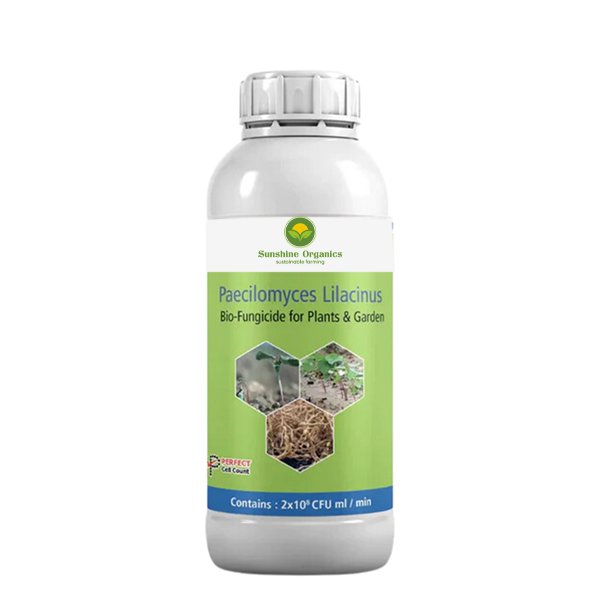
Metarhizium Anisopliae is a robust biological control agent renowned for its effectiveness in managing a variety of insect pests. This beneficial fungus acts as a natural insecticide by infecting and killing pests, providing an environmentally friendly alternative to chemical pesticides and promoting sustainable pest management practices.
- Provides effective control of a wide range of insect pests.
- Reduces dependence on chemical insecticides, supporting eco-friendly farming practices.
- Enhances plant health and crop productivity by managing pest populations naturally.
- Suitable for a broad spectrum of crops and pests.
- Metarhizium anisopliae offers a reliable and sustainable solution for managing insect pests.
- Soil Application:
- Mix 3 liters of Metarhizium anisopliae per acre with 200 kg of well-decomposed farmyard manure or biocompost.
- Apply to the soil before planting or during the growing season to target soil-dwelling pests.
- Foliar Spray:
- Mix 10 ml of Metarhizium anisopliae with 10 gm of jaggery per liter of water.
- Spray on plant foliage in the evening for optimal results.
- Repeat every 7 days or as needed based on pest infestation levels.
- Seed Treatment:
- Coat seeds with a Metarhizium anisopliae suspension prepared according to the product label.
- Allow seeds to dry before planting to protect emerging seedlings.
- Drip Irrigation:
- Apply 5 liters of Metarhizium anisopliae per acre through fertigation for targeted pest control.
- Cereal Crops:
- Sugarcane, Cotton, Paddy, Sorghum
- Oilseeds:
- Sunflower, Groundnut, Mustard
- Spices and Aromatics:
- Cumin, Cardamom
- Fruiting Crops:
- Grapes, Guava, Sapota, Citrus, Mango, Pomegranate, Custard Apple, Coconut
- Vegetables:
- General vegetables
- Flowering Plants:
- Various flowering plants
- Specialty Crops:
- Tea, Coffee
- Beetles: Controls various beetle species affecting crops.
- Leaf-Eating Caterpillars: Effective against caterpillars that cause significant foliage damage.
- Termites: Manages termite populations that damage plant roots and structures.
- White Grubs: Targets and controls soil-dwelling grubs.
- Sucking Pests: Reduces populations of pests that feed on plant sap.
- Root Grubs: Manages grubs that damage plant roots.
- Liquid Form: 500 ml, 1 liter, 5 liters, 30 liters, and 50 liters.
- Powder Form: 500 grams, 1 kg and 5 kg packets.
Metarhizium Anisopliae
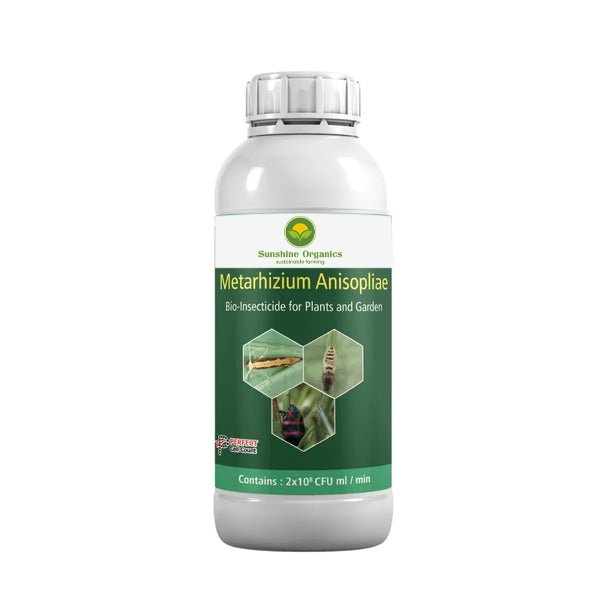
Verticillium Lecanii is a beneficial fungus used as a biological control agent to manage various insect pests. Known for its efficacy against soft-bodied insects, this fungus acts as a natural insecticide by infecting and killing pests, offering an environmentally friendly alternative to chemical treatments.
Verticillium Lecanii offers a versatile and eco-friendly solution for managing insect pests across diverse crops, contributing to healthier plants and improved agricultural outcomes through effective biological control.
- Provides effective control of soft-bodied insects.
- Reduces the need for chemical insecticides, supporting sustainable agriculture.
- Enhances plant health and productivity by naturally managing pest populations.
- Suitable for a wide range of crops and pests.
- Foliar Spray:
- Mix 10 ml of Verticillium lecanii with 10 gm of jaggery per liter of water.
- Spray directly onto plant foliage in the evening for optimal results.
- Repeat the application every 7 days or as needed based on pest levels.
- 2. Soil Application:
- Mix 3 liters of Verticillium lecanii per acre with 200 kg of well-decomposed farmyard manure or biocompost.
- Apply to the soil before planting or during the growing season to target soil-dwelling pests.
- 3. Seed Treatment:
- Prepare a suspension of Verticillium lecanii as per the product label instructions.
- Coat seeds with the suspension before planting to protect emerging seedlings.
- 4. Drip Irrigation:
- Apply 5 liters of Verticillium lecanii per acre through fertigation systems for targeted pest control.
- Cereal Crops:
- Sugarcane, Cotton, Paddy, Sorghum, Soybeans
- Oilseeds:
- Sunflower, Groundnut, Mustard
- Spices:
- Cumin, Cardamom, Ginger
- Fruiting Crops:
- Grapes, Guava, Sapota, Citrus, Mango, Pomegranate, Custard Apple, Coconut
- Vegetables:
- Tomato, Bhendi (Okra), Brinjal (Eggplant), Chillies, Onion, Potato
- Flowering Plants:
- Various ornamental plants
- Specialty Crops:
- Tea, Coffee, Betelvine
- Aphids: Effective against various aphid species that feed on plant sap.
- Whiteflies: Controls whiteflies that cause damage to foliage and transmit diseases.
- Spider Mites: Manages populations of spider mites that affect plant health.
- Scale Insects: Targets and reduces scale insect infestations.
- Mealybugs: Suppresses mealybug populations that feed on plant sap.
- Liquid Form: 500 ml, 1 liter, 5 liters, 30 liters, and 50 liters.
- Powder Form: 500 grams, 1 kg and 5 kg packets.
Verticillium Lecanii
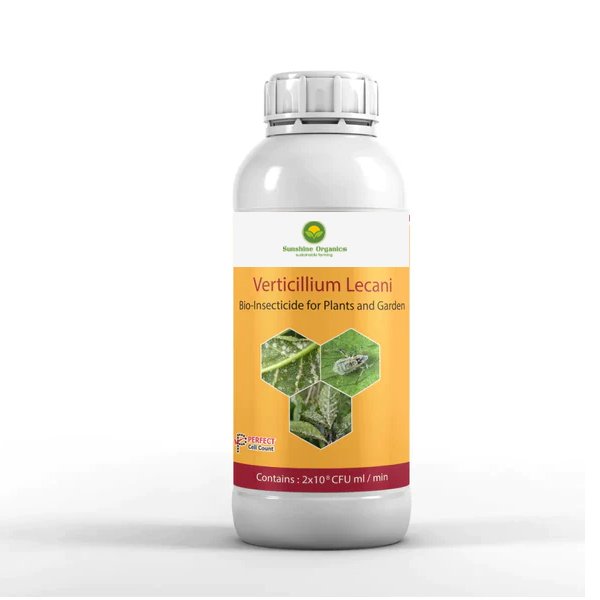
Beauveria Bassiana is a potent biological control agent recognized for its effectiveness against a variety of insect pests. This naturally occurring fungus infects and kills pests through its spores, offering a sustainable alternative to chemical insecticides and contributing to integrated pest management practices.
- Provides effective control of a wide range of insect pests.
- Reduces dependence on chemical insecticides, supporting eco-friendly farming practices.
- Enhances plant health and crop productivity by managing pest populations naturally.
- Suitable for a broad spectrum of crops and pests.
- Soil Application:
- Mix 3 liters of Beauveria Bassiana per acre with 200 kg of well-decomposed farmyard manure or biocompost.
- Apply to the soil before planting or during the growing season to target soil-dwelling pests.
- Foliar Spray:
- Mix 10 ml of Beauveria Bassiana with 10 gm of jaggery per liter of water.
- Spray on plant foliage in the evening for optimal results.
- Repeat every 7 days or as needed based on pest infestation levels.
- Seed Treatment:
- Prepare a suspension of Beauveria bassiana as per the product label instructions.
- Coat seeds with a Beauveria Bassiana suspension prepared according to the product label.
- Allow seeds to dry before planting to protect emerging seedlings.
- Drip Irrigation:
- Apply 5 liters of Beauveria Bassiana per acre through fertigation for targeted pest control.
- Cereal Crops:
- Sugarcane, Cotton, Paddy, Sorghum, Soybeans
- Oilseeds:
- Sunflower, Groundnut, Mustard
- Spices and Aromatics:
- Cumin, Cardamom, Ginger
- Fruiting Crops:
- Grapes, Guava, Sapota, Citrus, Mango, Pomegranate, Custard Apple, Coconut
- Vegetables:
- Tomato, Bhendi (Okra), Brinjal (Eggplant), Chillies, Onion, Potato
- Flowering Plants:
- Various ornamental plants
- Specialty Crops:
- Tea, Coffee, Betelvine
- Beetles: Controls various beetle species affecting crops.
- Leaf-Eating Caterpillars: Effective against caterpillars that cause significant foliage damage.
- Termites: Manages termite populations that damage plant roots and structures.
- Whiteflies: Suppresses whiteflies that harm plant leaves and transmit diseases.
- Spider Mites: Targets and reduces spider mite infestations.
- Mealybugs: Manages mealybug populations that feed on plant sap.
- Liquid Form: 500 ml, 1 liter, 5 liters, 30 liters, and 50 liters.
- Powder Form: 500 grams, 1 kg and 5 kg packets.
Beauveria Bassiana
